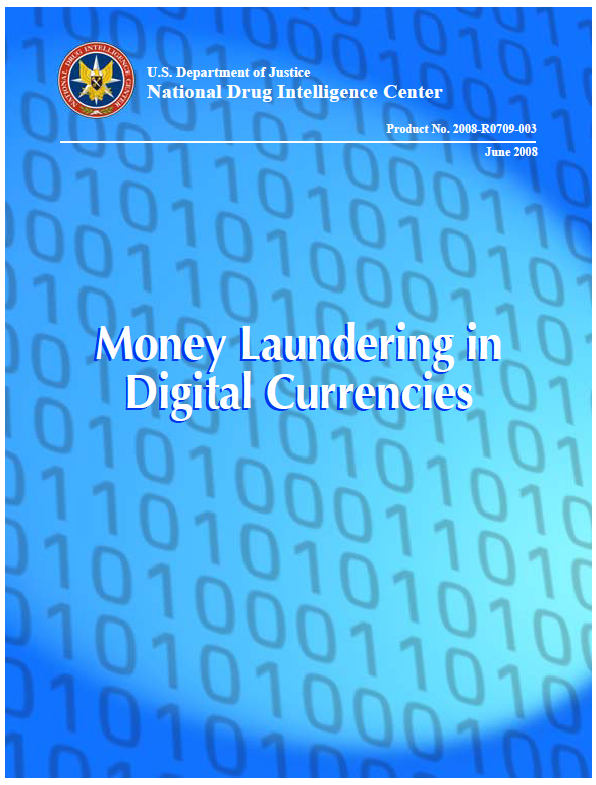 U.S. Department of Justice National Drug Intelligence Center
U.S. Department of Justice National Drug Intelligence Center
- 16 pages
- Law Enforcement Sensitive
- June 2008
Key Judgment
Digital currencies combine the intrinsic value of gold and other precious metals as well as the designated value of national currencies with the worldwide reach of the Internet to create an ideal mechanism for international money laundering. Users can anonymously fund digital currency accounts, send those funds (sometimes in
unlimited amounts) to other digital currency accounts worldwide, and effectively exchange the funds for foreign currencies—often while bypassing U.S. regulatory oversight.Introduction
Digital currencies provide an ideal money
laundering instrument because they facilitate
international payments without the
transmittal services of traditional financial
institutions. Such currencies allow direct
access to a remote payment mechanism and
can be used to launder illicit funds by sending
instant international remittances via the Internet.
Many components of the digital currency
system are incorporated in offshore and foreign
jurisdictions not subject to U.S. regulations;
however, their services are accessed in the
United States through the Internet. As such,
transactions can be completed with less fear of
documentation, identification, or law enforcement
suspicion. Such emerging electronic payment
systems are vulnerable to money
laundering and terrorist financing.Digital currencies are privately owned
online payment systems that allow international
payments, which are often denominated
in the standard weights for gold and
precious metals. Each digital currency functions
as one transnational currency; however,
none of these are recognized as currencies by
the U.S. government. Most digital currencies
claim to be backed by precious metals such as
gold, silver, platinum, and palladium; however,
very few can independently prove such backing.
Several digital currencies claim to be backed by
specific national currencies. Metal-backed digital
currency accounts are allegedly valued based
on the backing commodity’s fluctuating “spot
price” at the time of funding or withdrawal;
digital gold currencies (DGCs) are by far the
most popular type. Metal does not physically
change hands in transactions; rather, the
transfer is an accounting entry in which only
the designation of ownership changes (similar
to a stockholder whose shares represent a portion
of a company’s holdings). According to
the Global Digital Currency Association
(GDCA), digital currency transactions
account for billions of dollars each year—
digital gold currency transactions alone
increased from approximately $3 billion in
2004 to approximately $10 billion in 2006.The digital currency system is composed
of issuers, digital currency exchangers
(DCEs), and the individuals (including
merchants) who conduct transactions. Digital
currency issuers frequently own or control
a digital currency and are generally
responsible for maintaining the precious metals
used to back currencies or—in the case of
currencies not backed by metals or national
currencies—managing pooled bank accounts
in which users’ funds are maintained until
withdrawn. Issuers typically process digital
currency transactions and maintain online
records of users’ activities, including funding,
spending, fees, and withdrawals. Digital
currency exchangers (DCEs) facilitate funding
of and withdrawals from digital currency
accounts as well as conversion of one digital
currency to another. Such exchangers and
issuers are usually independent entities; however,
an issuer may have a corporate affiliation
with one particular DCE. Many DCEs
claim to accept any national currency (U.S.
dollars, euros, yen, etc.) in exchange for
digital currencies, as well as a variety of other
payment methods. Because digital currencies
operate independently, payments issued by a
specific digital currency can be accepted only
by merchants or individuals who accept that
digital currency, unless the payment is first
converted to the appropriate digital currency
through a DCE.
